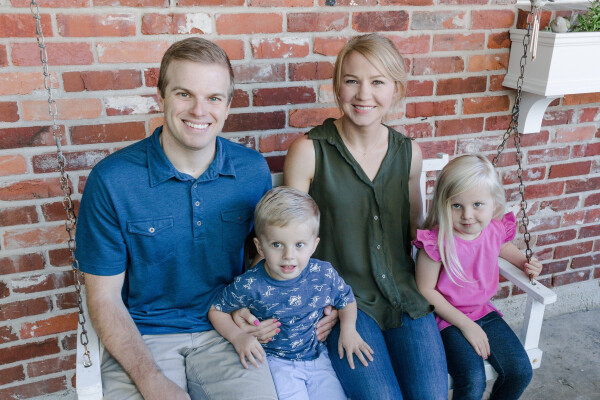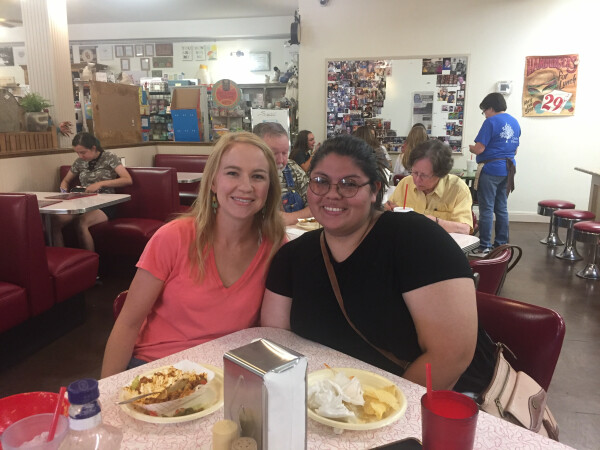Hospitality in the Desert Places
We invited Elizabeth to share the story behind her involvement in helping to found the Teacher Adoption Program for MISD. It's more than a call to help support MISD teachers (though it is that as well). It's a story of how Elizabeth's personal discipleship journey led her to explore what "radically ordinary hospitality" looks like in this season of her life.
BY ELIZABETH SOLLEE
Back in 2010, my then fiancé, Michael (who grew up living in various parts of the U.S and the world), tenderly told me he would prefer we not spend our lives in my native Midland. At the time, he couldn’t wrap his mind around the joy of living in a small, desert town with expensive houses and few entertainment options. However, after living in Denver for 5 years, an oil job and a colicky newborn brought us back to my homeland, where we had family and support waiting. In 2015, Midland was in another boom, homes were hard to find, and we settled in a new-ish neighborhood on the west side of town. We realized many of our neighbors were also new to Midland, but many were states away from any kind of family or friend support. Countless seemed lonely, astonished they had somehow ended up here, and were regularly asking their companies for a transfer to a bigger city. In many ways, this is how I had felt in Denver after our first baby was born—isolated, alone, and forgotten. Michael and I felt the Holy Spirt tug; our hearts ached for these young families, and we brainstormed ways we could live a more hospitable and welcoming life.

Fast forward a couple of years-- we assumed the move would be temporary, (doesn’t everyone who moves to Midland for a job?) but as the oil company takeovers commenced, it became more obvious this would be a longer-term spot for us. As our kids approached school age, we began to look around at the status of education in Midland. Of course, we had heard the grumblings over the last few years: the Midland schools are deteriorating, the facilities are atrocious, the good teachers keep leaving. In a town where many have unlimited resources, it seemed strange that someone couldn’t figure out a way to just quickly “fix” the school district. As I began to research, I learned about some of the systemic issues (the “Robin Hood” policy, failed school bonds, high poverty rate among students, low parental involvement, etc). I quickly became overwhelmed. I participated in negative conversations about our schools, played the blame game, and generally felt very hopeless about our children’s educational future here. Part of the despair came from grief—while my experience at Midland High hadn’t been perfect, I had had several exceptional teachers, especially in math, physics, and economics, that had built my interest in getting my engineering degree from Texas A&M. Imagining my kids in a crumbling school with disheartened teachers terrified and saddened me.
I was in this place of uneasiness (and self-absorbed worry for my own kids’ futures) when I heard a sermon one Sunday by Pastor Steve. I don’t remember much of what he said (forgive me, Steve), but a couple of ideas really stuck with me. Steve mentioned a book The Gospel Comes with a House Key by Rosaria Butterfield. In this book, Rosaria stresses the importance for Christians to live lives of “radically ordinary hospitality.” Steve emphasized that we could find small ways, every single day, to love our neighbors well. This idea reminded me of the ways Michael and I had tried to love on our new-to-Midland neighbors—never with big gestures, but in small, easily-doable actions. Sometimes this looked like inviting a family over for dinner, physically checking on a new mom a few doors down, or simply striking up a conversation at the park. I then began to wonder if in some way, this idea of small gestures could be applied to our school system problems.
As an introvert with zero political aspirations, I knew pushing for a bond or trying to take on the “Robin Hood” policy was out of my league. However, the ever-increasing teacher turnover was perhaps something I could dive into more thoroughly. I knew MISD had been offering competitive salaries for new teachers, so I wondered why many teachers decided to leave after only a year or two of teaching. I created a survey of 5 simple questions and emailed them to as many MISD teachers as I could find. When it was all said and done, I sent the survey out to over 900 teachers whose emails I found readily available on the schools’ websites. Around 250 teachers responded, many with several paragraphs of optional comments at the end of the survey. It seemed many were desperate to be heard and were quick to respond when an unknown community member asked how things were going. I immediately saw two valuable takeaways from the survey results—
- Greater than 50% of those responding had been teaching at MISD for less than 5 years.
- The top ranked challenge as an MISD teacher was loneliness and/or isolation.

All at once, I saw these teachers as I had seen my new-to-Midland neighbors; they were people starting a challenging job, in a new place, without much family or friend support. “Here”, a Voice whispered, “is where you can make a difference.” With nothing more to go on than some survey results and a little hope, God opened doors. Through the help of various covenant partners at First Pres, I met with several organizations to try to get some sort of program started. With the help of Jami Owen at the MISD foundation and Nellwyn Barnett at the Midland Chamber of Commerce, the Teacher Adoption Program (TAP) was created. The goal of TAP is to provide Midland teachers with a community of tangible support, care and encouragement. Essentially, an individual, family, or group can sign up to “adopt” a teacher for the school year. Both the teacher and adopter(s) commit to a monthly meetup, and the adopter(s) agree to regularly connect with their teacher via encouraging letters, care packages, meals, or other creative means. In 2019, I was connected with a Midland High School teacher. She was new to town, a newly single mom of a 2-year-old, and taught various subjects at MHS, including Oil and Gas. Over monthly lunches, we got to know each other, and I was able to support her in ways I never would have known about otherwise. I gathered a few of my oil and gas friends to come speak to her class. I invited her and her daughter to come swim at our neighborhood pool with us a few times over the summer. I shared some of my “Midland knowledge” on different pediatricians, favorite parks, and preferable daycares. I had the privilege of getting to know this wonderful, courageous young woman who bravely moved to a new place to try to give her daughter the best opportunities available.
Of course, the pandemic hit, and everything slowed way down. My adopted teacher moved back to her hometown so she could teach virtual school and have help with her daughter. The entire Teacher Adoption Program hit a wall as people struggled to deal with their own troubles of school and work amid the shutdowns. TAP is still active, but at this time only has 9 volunteers signed up to adopt a teacher for the 2021-2022 school year. My First Pres discipleship group has recently decided to sign up as a team to adopt a teacher as part of our commitment to hospitality and service. I invite you to consider also becoming a volunteer. Though this program will never solve some the district’s bigger problems, it is a means through which we as individuals can impact a few of the lives in our community in a big way. As Christians, it is a tool to help us start to express our “radically ordinary hospitality”. As Midlanders, it is a chance for us to show our teachers that while we may be a desert town in the middle of nowhere, there is something special about this place that makes it worthy to be called home.
